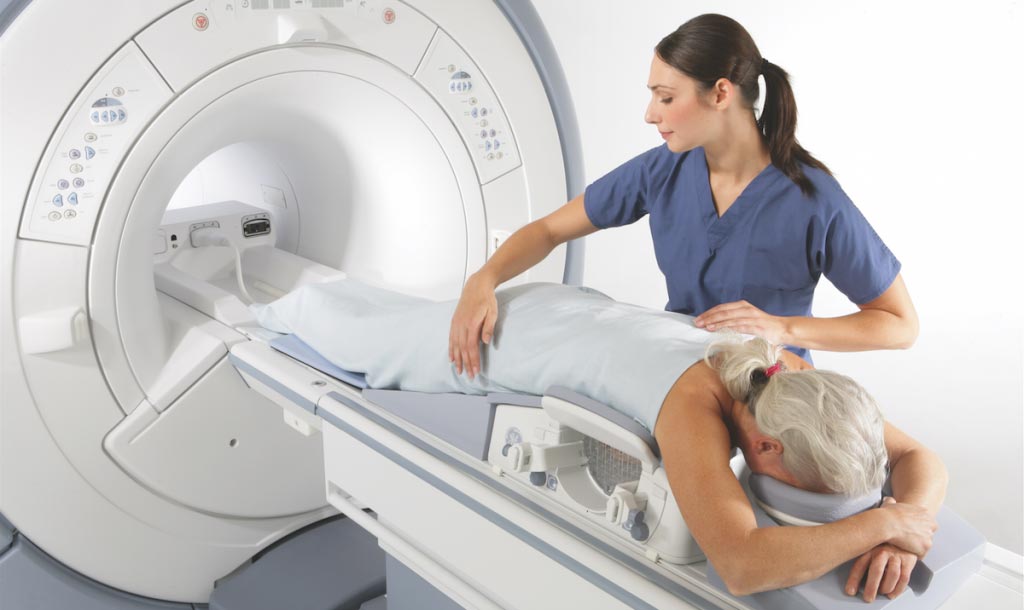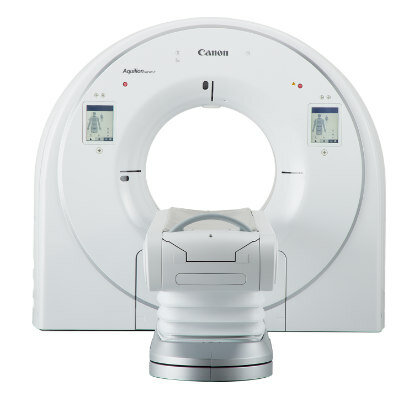Researchers Recommend MRI for Supplemental Breast Cancer Screening
|
By MedImaging International staff writers Posted on 21 Feb 2017 |

Image: A new study indicates women can benefit from MRI screening more than ultrasound for supplemental breast cancer screening (Photo courtesy of Breastlink).
Researchers have shown that MRI screening can improve the early diagnosis of breast cancer for all women, not only those at high risk, and is a useful supplemental screening tool.
The study showed that women at average risk, and those with dense breast tissue, could benefit more from Magnetic Resonance Imaging (MRI) as a supplemental screening tool than ultrasound.
The study was carried out by researchers at the University of Aachen and published online in the February 2017 issue of the journal Radiology.
Current guidelines limit MRI screening partly because of higher costs, however with the continued high levels of mortality in women from breast cancer improved screening methods are still necessary. MRI is also able of detecting more aggressive types of breast cancer that occur in women – also know as interval cancers – that may affect those with dense breast tissue.
Christiane Kuhl, MD, said, "The faster a cancer grows and the better it is in seeding metastases, the better will it be picked up early by MRI. In our cohort, cancers found by MRI alone exhibited features of rapid growth at pathology. The interval cancer rate in our study was zero percent. Not a single cancer was undetected that became palpable. This suggests that MRI finds breast cancers that also mammography would find, but MRI detects them earlier, and it finds the cancers which, if MRI had not been done, would have progressed to interval cancers."
The study showed that women at average risk, and those with dense breast tissue, could benefit more from Magnetic Resonance Imaging (MRI) as a supplemental screening tool than ultrasound.
The study was carried out by researchers at the University of Aachen and published online in the February 2017 issue of the journal Radiology.
Current guidelines limit MRI screening partly because of higher costs, however with the continued high levels of mortality in women from breast cancer improved screening methods are still necessary. MRI is also able of detecting more aggressive types of breast cancer that occur in women – also know as interval cancers – that may affect those with dense breast tissue.
Christiane Kuhl, MD, said, "The faster a cancer grows and the better it is in seeding metastases, the better will it be picked up early by MRI. In our cohort, cancers found by MRI alone exhibited features of rapid growth at pathology. The interval cancer rate in our study was zero percent. Not a single cancer was undetected that became palpable. This suggests that MRI finds breast cancers that also mammography would find, but MRI detects them earlier, and it finds the cancers which, if MRI had not been done, would have progressed to interval cancers."
Latest MRI News
- Low-Cost Whole-Body MRI Device Combined with AI Generates High-Quality Results
- World's First Whole-Body Ultra-High Field MRI Officially Comes To Market
- World's First Sensor Detects Errors in MRI Scans Using Laser Light and Gas
- Diamond Dust Could Offer New Contrast Agent Option for Future MRI Scans
- Combining MRI with PSA Testing Improves Clinical Outcomes for Prostate Cancer Patients
- PET/MRI Improves Diagnostic Accuracy for Prostate Cancer Patients
- Next Generation MR-Guided Focused Ultrasound Ushers In Future of Incisionless Neurosurgery
- Two-Part MRI Scan Detects Prostate Cancer More Quickly without Compromising Diagnostic Quality
- World’s Most Powerful MRI Machine Images Living Brain with Unrivaled Clarity
- New Whole-Body Imaging Technology Makes It Possible to View Inflammation on MRI Scan
- Combining Prostate MRI with Blood Test Can Avoid Unnecessary Prostate Biopsies
- New Treatment Combines MRI and Ultrasound to Control Prostate Cancer without Serious Side Effects
- MRI Improves Diagnosis and Treatment of Prostate Cancer
- Combined PET-MRI Scan Improves Treatment for Early Breast Cancer Patients
- 4D MRI Could Improve Clinical Assessment of Heart Blood Flow Abnormalities
- MRI-Guided Focused Ultrasound Therapy Shows Promise in Treating Prostate Cancer
Channels
Radiography
view channel
Novel Breast Imaging System Proves As Effective As Mammography
Breast cancer remains the most frequently diagnosed cancer among women. It is projected that one in eight women will be diagnosed with breast cancer during her lifetime, and one in 42 women who turn 50... Read more
AI Assistance Improves Breast-Cancer Screening by Reducing False Positives
Radiologists typically detect one case of cancer for every 200 mammograms reviewed. However, these evaluations often result in false positives, leading to unnecessary patient recalls for additional testing,... Read moreUltrasound
view channel
Super-Resolution Imaging Technique Could Improve Evaluation of Cardiac Conditions
The heart depends on efficient blood circulation to pump blood throughout the body, delivering oxygen to tissues and removing carbon dioxide and waste. Yet, when heart vessels are damaged, it can disrupt... Read more
First AI-Powered POC Ultrasound Diagnostic Solution Helps Prioritize Cases Based On Severity
Ultrasound scans are essential for identifying and diagnosing various medical conditions, but often, patients must wait weeks or months for results due to a shortage of qualified medical professionals... Read more
Largest Model Trained On Echocardiography Images Assesses Heart Structure and Function
Foundation models represent an exciting frontier in generative artificial intelligence (AI), yet many lack the specialized medical data needed to make them applicable in healthcare settings.... Read more.jpg)
Groundbreaking Technology Enables Precise, Automatic Measurement of Peripheral Blood Vessels
The current standard of care of using angiographic information is often inadequate for accurately assessing vessel size in the estimated 20 million people in the U.S. who suffer from peripheral vascular disease.... Read moreNuclear Medicine
view channelNew PET Agent Rapidly and Accurately Visualizes Lesions in Clear Cell Renal Cell Carcinoma Patients
Clear cell renal cell cancer (ccRCC) represents 70-80% of renal cell carcinoma cases. While localized disease can be effectively treated with surgery and ablative therapies, one-third of patients either... Read more
New Imaging Technique Monitors Inflammation Disorders without Radiation Exposure
Imaging inflammation using traditional radiological techniques presents significant challenges, including radiation exposure, poor image quality, high costs, and invasive procedures. Now, new contrast... Read more
New SPECT/CT Technique Could Change Imaging Practices and Increase Patient Access
The development of lead-212 (212Pb)-PSMA–based targeted alpha therapy (TAT) is garnering significant interest in treating patients with metastatic castration-resistant prostate cancer. The imaging of 212Pb,... Read moreGeneral/Advanced Imaging
view channel
Radiation Therapy Computed Tomography Solution Boosts Imaging Accuracy
One of the most significant challenges in oncology care is disease complexity in terms of the variety of cancer types and the individualized presentation of each patient. This complexity necessitates a... Read more
PET Scans Reveal Hidden Inflammation in Multiple Sclerosis Patients
A key challenge for clinicians treating patients with multiple sclerosis (MS) is that after a certain amount of time, they continue to worsen even though their MRIs show no change. A new study has now... Read moreImaging IT
view channel
New Google Cloud Medical Imaging Suite Makes Imaging Healthcare Data More Accessible
Medical imaging is a critical tool used to diagnose patients, and there are billions of medical images scanned globally each year. Imaging data accounts for about 90% of all healthcare data1 and, until... Read more
Global AI in Medical Diagnostics Market to Be Driven by Demand for Image Recognition in Radiology
The global artificial intelligence (AI) in medical diagnostics market is expanding with early disease detection being one of its key applications and image recognition becoming a compelling consumer proposition... Read moreIndustry News
view channel
Hologic Acquires UK-Based Breast Surgical Guidance Company Endomagnetics Ltd.
Hologic, Inc. (Marlborough, MA, USA) has entered into a definitive agreement to acquire Endomagnetics Ltd. (Cambridge, UK), a privately held developer of breast cancer surgery technologies, for approximately... Read more
Bayer and Google Partner on New AI Product for Radiologists
Medical imaging data comprises around 90% of all healthcare data, and it is a highly complex and rich clinical data modality and serves as a vital tool for diagnosing patients. Each year, billions of medical... Read more


















